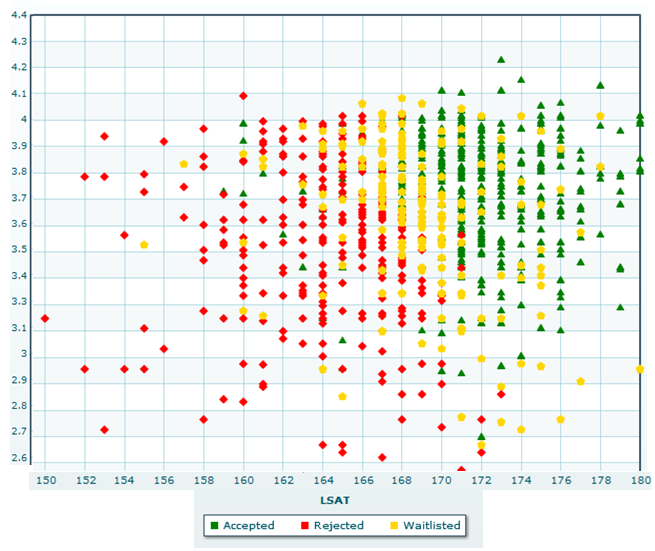
“Soft” factors can be considered all elements outside of the LSAT and undergraduate grade point average including graduate school GPA, choice of major, professional, international, leadership and volunteer experience, application essays, foreign language fluency, letters of recommendation, academic research, and legacy admissions. For soft factors to be weighed more in relation to the LSAT, they have to be AMAZING, ie. founding a very successful company, winning an Olympic medal, or spending ten years of your life caring for HIV-infected orphans in sub-Saharan Africa.
If you come from a university that admissions committees would be unfamiliar with, or graduated from a school outside of the United States, the LSAT may be weighed much more than 60%. Likewise, if you have been out of school for a long time, the LSAT may also be looked at as a clearer representation of your abilities than your undergraduate GPA.
It may seem hard to believe that the results of a 3.5 hour test substantially outweigh everything else you have accomplished in your life up to this point. However, with GPA inflation running rampant at universities across the country, and many applicants likewise inflating their accomplishments on resumes and CVs, law school admissions committees are left with the LSAT as the only clear measuring tool for the thousands of applications they receive yearly. The LSAT likewise has proven through several statistical studies to be most highly correlated of all admissions factors with first-year law school success. Students with high LSAT scores generally perform much better in law school than those with low LSAT scores.
To further illustrate my point, take a look at the following self-reported application data from the website www.lawschoolnumbers.com for Georgetown Law School 2009-2010 admissions cycle outcomes:

All those applicants accepted to Georgetown with an LSAT score of less than 168 are as a result of the underrepresented minority (URM) boost which is given to those of African, Mexican, Puerto Rican, and Native American decent. While the lowest LSAT score of a non-URM candidate is a 168 (96th percentile of LSAT scores), the GPAs of those accepted dip all the way to 2.7 (around the 15th percentile of law school applicants). Just by eyeballing the graph, it is clear that applicants with exceptional GPAs (3.8+) and good LSAT scores (160-169) are almost always rejected. However, those with exceptional LSAT scores (170+) and good GPAs (3.3-3.8) are almost always accepted. Those with bad GPAs are sometimes accepted and many times out on the waitlist.
The point I am trying to make is that the LSAT is very, very important in getting accepted to whichever school you'd like to attend. This link has a list of the 25th/75th percentile LSAT scores for most law schools in the United States. If you are able to achieve the 75th percentile LSAT score for the school you wish to attend, you have a very good chance of being accepted. However, having a 75th Percentile GPA gives no assurance at all that you will be accepted.
Many applicants do not necessarily want to attend top schools like Harvard, Chicago, and Stanford. However, almost everyone wants to graduate from school with as little debt as possible. Getting an LSAT score which is high in comparison to other accepted students at your target school will open up the door to large amounts of financial aid. In many cases, a one point difference on the LSAT may make the difference between $60,000 and nothing offered in scholarship money.
Preparing as best as possible for the LSAT is a great investment. Whenever you lack motivation to study, remember that there is a great chance that you are paying yourself hundreds, if not thousands of dollars per extra hour of study you put in.
The point I am trying to make is that the LSAT is very, very important in getting accepted to whichever school you'd like to attend. This link has a list of the 25th/75th percentile LSAT scores for most law schools in the United States. If you are able to achieve the 75th percentile LSAT score for the school you wish to attend, you have a very good chance of being accepted. However, having a 75th Percentile GPA gives no assurance at all that you will be accepted.
Many applicants do not necessarily want to attend top schools like Harvard, Chicago, and Stanford. However, almost everyone wants to graduate from school with as little debt as possible. Getting an LSAT score which is high in comparison to other accepted students at your target school will open up the door to large amounts of financial aid. In many cases, a one point difference on the LSAT may make the difference between $60,000 and nothing offered in scholarship money.
Preparing as best as possible for the LSAT is a great investment. Whenever you lack motivation to study, remember that there is a great chance that you are paying yourself hundreds, if not thousands of dollars per extra hour of study you put in.
Start your personal preparation early and enroll in a good LSAT preparation course to gain an edge in the preparation process.

No comments:
Post a Comment